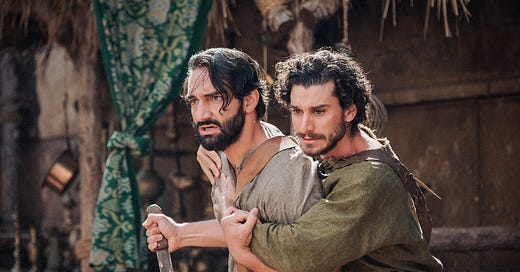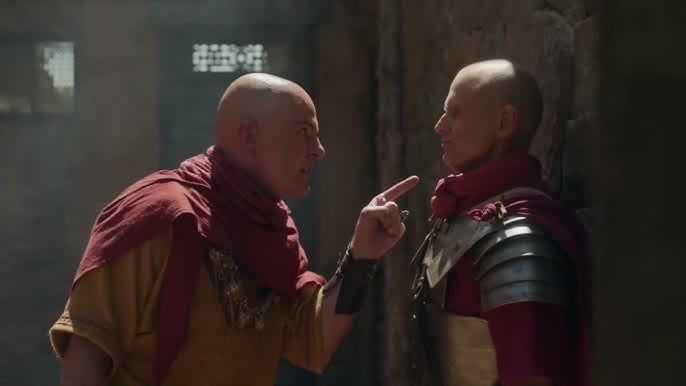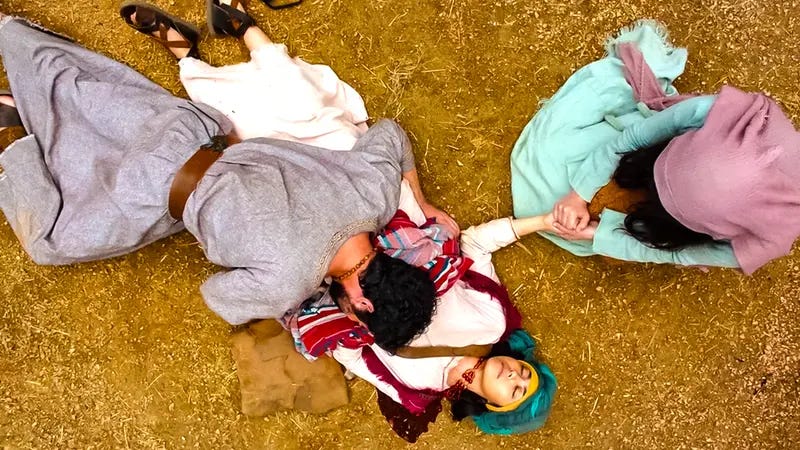Summary
We begin this episode with something very unfamiliar to us in modern life. David lays prostrate on the ground wearing sackcloth and ashes. He is in repentance of his sin of adultery with Bethsheba begging for God’s forgiveness. We then learn the child has passed. Bethsheba breaks down at the loss of her child. David submits to God’s will and restores and nourishes himself because God’s will has been made known. The discussion between David and Bethsheba is about the perennial believer’s question, “Why does God answer some prayers and not others?” Despite their grief the couple recognizes that they must keep faith that in time they will be reunited with their child.
Quintus emerges from his office in fit of rage. As Atticus’s warning indicated last episode, something needs to be done about Jesus and his followers if Quintus doesn’t want to lose control over his city. The problem for Quintus is his disdain for the Jewish people and complete self-obsession prevents him from understanding what is going on. He commands Gaius to fix the problem by forcing the tent city to shrink.
When James and John don’t get excited about Zebedee’s good fortune, their mother detects that something from their latest trip has them upset. Salome refuses to watch her sons to concede anything and demands that they ask Jesus for prominent positions. The discussion highlights another great Christian tension between persistence and submission. We get a short scene where Thomas and Ramah continue their courtship as he presents her with as sundial as “the object of value” or wedding gift for the start of their new life together. We return to James, John, Peter, and Matthew with Jesus as he talks of a sermon he will soon be delivering. James and John seem completely uninterested as they sort out how they will fulfill their mother’s wish and ask Jesus for titles and authority. Meanwhile, Peter admits to Matthew that he believes the upcoming sermon is a bad idea since Jerusalem’s edict against Jesus has reached Capernaum, but Peter defers to Jesus exemplifying the difference between himself and the sons of thunder.
Before Jesus’s sermon begins he all but confirms that what he is about to do will greatly disturb both the political and religious leaders of Capernaum. He kicks it off with the healing of Uzziah who has been blind since birth. Jesus speaks of great Providence that Uzziah was not punished for anyone’s sin but is just another instrument that God will work through in his ministry to demonstrate his Messianic mission. As Uzziah gains his sight, the crowd forms and a Pharisee rushes Uzziah off to the synagogue. The crowd calls for another miracle, but Jesus explains that he has come to teach them instead.
Uzziah informs the Pharisees about how he was made to see. They question him repeatedly and then his parents but refuse to accept the truth that Jesus must be the Messiah. Instead, they reject the obvious and rush off to confront Jesus. Jesus has continued his message to the crowd and warned of the present generations need for repentance. The Pharisees quarrel with arrogance that their following of the law grants them a superiority to the unrepentant of the past. Jesus contends that exact perspective is demonstrative of just how blind they are to the law and deaf to the warnings of the prophets. The crowd becomes more chaotic as the Romans arrive. Gaius refuses to act for Quintus and sets up his rash leader for failure.
Jesus is rushed away by the apostles as Quintus makes his move, but some of the disciples are separated in the chaos including Ramah. Thomas is preoccupied with finding Ramah and getting her to safety and does not notice that Quintus has completely lost control and is brandishing his sword. As he ignores Quintus and leads Ramah past the deranged dominus, Quintus thrusts his sword through Ramah’s back. To everyone’s horror, Ramah collapses and begins to fade. Chaos erupts as the crowd disperses, Atticus takes Quintus away, and Jesus returns to the scene sensing the tragedy. In her final wish, Ramah asks Thomas to stay with Jesus. Thomas turns to Jesus and begs for a healing of Ramah. But, Jesus only apologies and states that both he and The Father love Thomas. The episode ends with Thomas in anguish as he lays on Ramah’s body.
Megan’s Insight
This episode has too much content to discuss in just one article. There are two lines I want to take just a minute to reflect on. The first line is directly from Scripture and the other is from the imaginations of the writers. Both of these moments from will have a lasting impact on the series.
In this episode, we hear the popular popular verse from John 9:25, “He replied, ‘If he is a sinner, I do not know. One thing I do know is that I was blind and now I see.”’ I think Ryan Radis (actor playing Uzziah) did a phenomenal job delivering this line. This whisper was truly powerful. Blindness is a theme in the current timeline of the series. The Apostle Thomas is blinded by grief and unable to comprehend Jesus’s refusal to heal Ramah. We know from Scripture that after the Resurrection Thomas will say, “Unless I see the nail marks in His hands… I will not believe.” The pharisees are also blind in the sense that they cannot see the fulfillment of the prophesies, their Messiah, standing before them. Jesus calls them “blind guides.” John and James are blinded by their jealousy regarding Peter’s place of authority. Judas is blind to Jesus’s mission.
Atticus is intrigued by Gaius’s reaction to Jesus in the square. As the gathering starts to grow, Atticus tells Gaius to relay a message to Quintus, “What you do next will determine your career.” Gaius sends a centurion give the message to Quintus but Atticus returns to reprimand Gaius. When Atticus realizes that Gaius is not taking action he asks, “Has the preacher gotten to you?” and laughs. He thinks Gaius may be allowing the riot so that Quintus takes the fall. After Gaius asks Atticus what he will do if this is true, Atticus responds, “Rome doesn’t penalize ambition, primi, but you are taking a huge gamble. One of you won’t survive this.” Luckily, Gaius does survive. His ambition is not selfish. In this moment, he desires to protect Jesus and His followers, not to seek a position of authority. I think this line from Atticus is poignant because ambition can often become dangerous when we do not first check our hearts.
Mitchell’s Insight
A common question to those of faith is, “Why would God allow terrible thing A to happen? He did wonderful thing B, so he is powerful enough to stop terrible thing A. Why didn’t he?” This is the question we find ourselves asking throughout this episode. A baby is allowed to die because of his parents sins. A blind man is healed seemingly randomly. A faithful follower of the Lord is struck down when there doesn’t seem to be a reason why she couldn’t be saved. There is no definitive answer to explain all this. The best we can say is that they are all part of God’s active or permissive will. To distinguish the two going forward I will describe God’s active will as something God wants to happen and God’s permissive will as something God allows to happen.
I think each of these three big events in the episode can be easily sorted into things God wants and allows. Because God is all good he never wants bad things to happen. God does not want the death of an innocent baby or the murder of one of his followers. These acts only come about because of the fallen nature of the world. Individuals are free to choose good or evil, and God rarely intervenes. This can easily cause us to question God’s goodness. However, faith can assure us that God would only permit these acts of evil because He can bring a greater good from it. God’s permissive will is what allows us to be free while maintaining God as the source of all goodness.
Michael’s Insight
“Father, if you are willing, remove this cup from me; yet, not my will but yours be done.” - Luke 22:42
Man we can really struggle with this one at times. It is especially hard during times of anguish and loss. When everything is going “according to plan”, and suddenly the rug is pulled right out from under us, and we are left in a tailspin. “But Father, this is not how it was supposed to go!” “Lord, I am not ready for this!” “How could you allow this to happen Father?” Even those of us who are strong in faith can allow these thoughts to enter our minds when the life of a loved one ends suddenly and without warning.
As Ramah lays dead in Thomas’ arms, Thomas cries out to Jesus, “Heal her, fix this!” He pleads with Jesus that, “this is a mistake!” Jesus’s reply to Thomas is simple, “It is not her time.” Now does this mean that God wanted Ramah to die at this specific time? Does it mean that He planned it so that she would be killed right here, right now by Quintus? Well, if you look at Jesus’s reaction to Ramah’s death, He is absolutely heartbroken for Thomas and is pained by Thomas’ grief. So why did He not revive Ramah?
If you are looking for the answer to this question, I would refer you to the opening flashback of this episode. King David prays to the Father for repentance, so that He might have mercy on his child. But David’s prayer is not answered, and the child passes. David immediately stops praying, washes, and gets ready for dinner. When Bathsheba asks David how he can so quickly he can move on from grieving, he responds by telling her that he grieved and fasted as their child was dying and he thought that God might have mercy on him. But now the child is dead, and grieving will not bring him back. Bathsheba asks him why some prayers are answered and others are not? David says that he does not know, but he will continue to pray regardless of the Lord’s answer, for that is true faith. Trusting the Lord’s will.
We have seen several times in The Chosen that Jesus is very deliberate about when, where, and to whom He performs His miracles. It is never without purpose, and it is never random. It was not His will that Ramah be healed. Ramah’s death is an example that this World is fallen, and the evil that infects the World will continue to spread pain and death until the end of days. That is why we must have faith like David. We do not need to know why God does or does not answer our prayers, but we must continue to pray for repentance and ask for His mercy, accepting that His will be done.
There is a comforting passage from J.R.R. Tolkien’s novel The Silmarillion, that I have quoted a few times before and I think that it is the perfect response to Thomas and Bathsheba’s pleas for answers. In the Silmarillion during the creation of the World, Melkor (Tolkien’s Satan figure) attempts to circumvent God’s will by altering the music of creation that God had prepared. God’s response to Melkor is as follows:
“And thou, Melkor, shalt see that no theme may be played that hath not its uttermost source in me, nor can any alter the music in my despite. For he that attempteth this shall prove but mine instrument in the devising of things more wonderful, which he himself hath not imagined.”
Jesus tells Thomas that, “It is not her time.” But we know what happens in the end. There is no evil that Satan can bring upon the World that God cannot make good. The time for Ramah’s resurrection will come. As the Lord says in the Revelation of John, “Behold, I make all things new.”
Take to Prayer
If there are hardships you have a hard time making sense of, don’t be afraid to pour your heart out to the Lord. Not only will he not be offended, but God wants you to share your heart with Him.
Bible Verses
David’s Repentance - 2 Samuel 12: 15-23
Healing of the Man Born Blind - John 9
The Demand for a Sign - Matthew 12: 38-42
Denunciation of the Scribes and Pharisees - Matthew 23: 1-36








